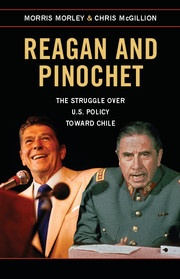4 - Changing Tack
Published online by Cambridge University Press: 05 February 2015
Summary
By 1986, the Chilean dictatorship seemed out of step with a transformed regional political landscape, and the nation was led by what Secretary of State George Shultz now pointedly called “the odd men out.” Within the State Department, the debate over Chile policy had decisively shifted in favor of a more activist effort to prod the ruling generals to improve the human rights situation and accelerate the democracy transition process. Driving this new approach were Shultz, Assistant Secretary of State for Inter-American Affairs Elliott Abrams, his deputy Robert Gelbard, Ambassador Harry Barnes, and their bureaucratic allies, who were, in turn, being continuously pressured by Congress where dwindling support for the autocratic regime was evidenced by the defection of previously uncommitted legislators more and more annoyed by “Pinochet’s continued intransigence and [the] persistence of severe human rights violations.” Yet making Pinochet and his more conservative advisers appreciate Washington’s commitment to this policy shift remained an uphill battle given a strong belief in Santiago that the regime still had the unstinting support of senior Defense and White House officials. This necessitated repeated messages to the regime leaders, often via Chilean Ambassador Hernán Errázuriz, that “there [were] no significant divergences within the administration on Chile policy” and that Ambassador Barnes had the President’s unqualified support.
Pinochet’s refusal to deal with the National Accord in a way that might advance the transition to democracy had a number of significant implications. First, it provided further evidence – if any was needed – of his total refusal to compromise or bend to opinions other than his own. The Accord was not a perfect arrangement from the military’s point of view: many of its signatories were divided by “old feuds and rivalries” and disagreed over some of the concessions the regime would have to make to warrant the opposition’s full cooperation. Nonetheless, those who signed the multiparty document had come close to accepting Pinochet’s transition plan in full.
- Type
- Chapter
- Information
- Reagan and PinochetThe Struggle over US Policy toward Chile, pp. 147 - 198Publisher: Cambridge University PressPrint publication year: 2015

